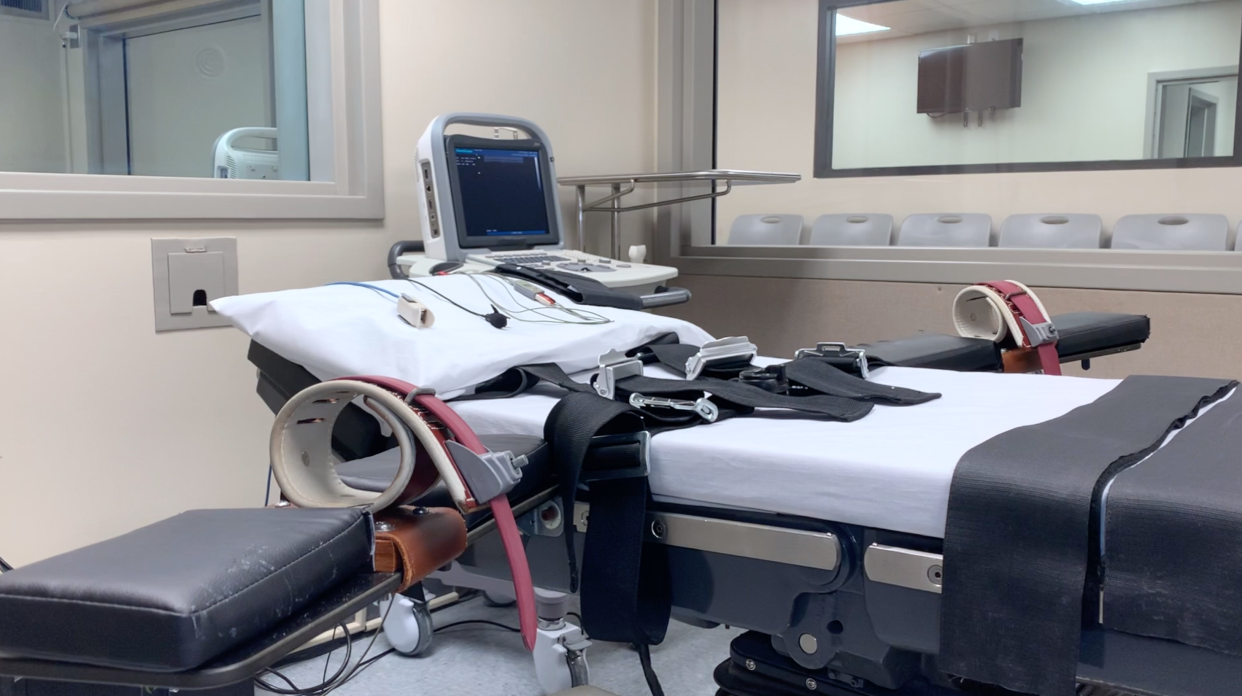Future executions in Oklahoma to be set for 90 days apart

The Oklahoma Court of Criminal Appeals has decided future executions will be set 90 days apart "unless circumstances dictate modification."
Oklahoma Attorney General Gentner Drummond had asked for more time to reduce the stress on the volunteer execution teams. He was joined in the request by Steven Harpe, the executive director of the Department of Corrections.
"The present pace of executions, every 60 days, is too onerous and not sustainable," Harpe said.
The decision on 90-day intervals was announced Tuesday. It was not unanimous. Two of the five judges called for executions to remain at 60 days apart.
"Individuals in many professions face demanding and arduous duties as part of their job requirements," Judge Gary Lumpkin wrote in opposing more time. "Personnel in our military continuously face life and death situations but they step up each day and do their duty."
All five judges agreed, though, that executions will be set one at a time from now on instead of in phases.
The state has a backlog because of a hiatus on lethal injections that lasted almost seven years. A dozen have been carried out since they resumed in 2021 at the Oklahoma State Penitentiary in McAlester. The latest was April 4.
Drummond and Harpe in January asked the court to go to 90-day intervals once the second phase of executions is completed in June.
Why were executions halted in Oklahoma?
Executions were put on hold after the wrong deadly drug was almost used on Sept. 30, 2015, on death row inmate Richard Glossip. A doctor involved in the process discovered the mistake and the execution was called off.
Officials later confirmed the same wrong deadly drug had been used inadvertently during an execution on Jan. 15, 2015. Oklahoma resumed executions on Oct. 28, 2021.
Four had taken place by mid-2022 when the Oklahoma Court of Criminal Appeals scheduled 25 more.
That schedule came out on July 1, 2022, after those inmates lost a legal challenge to the lethal injection protocol. The schedule called for the executions to be completed in five phases by the end of 2024.
Earlier: Oklahoma prisons chief wants executions every 90 days to relieve burden on staff
Lethal injections in each phase were scheduled about four weeks apart, with two-month breaks between phases.
Drummond last year called for a change to 60-day intervals to reduce the stress on staff and give more time for training. The Court of Criminal Appeals agreed, resetting seven executions.
The court acknowledged Tuesday that scheduling executions in phases has not worked. Judges told the attorney general to timely notify them each time an inmate is executed, gets a stay or has a stay lifted so the next execution can be set.
Lumpkin on Tuesday pointed out the Department of Corrections carried out 18 executions in 2001, seven in 2002 and 14 in 2003.
"It is time to realize the victims and their families must be remembered and the law established by the Oklahoma Legislature followed," he wrote. "As shown in 2001-2003 by the actions of DOC employees, they can step up to meet the challenges placed before them when proper leadership is provided."
Judge says people doing executions need to suck it up
Lumpkin also had harsh comments at a hearing on the 90-day request in March.
"We set a reasonable amount of time to start this out, and y'all keep pushing it and pushing it and pushing it," he said to Drummond. "And who’s to say next month you won’t come in and say, 'I need 120 days?'
"This stuff needs to stop, and people need to ... suck it up, realize they've got a hard job to do, and get it done in a timely, proficient, professional way.. And I'm not buying the sympathy stuff."
Still scheduled for execution June 6 is Wade Lay, who fatally shot a Tulsa bank guard during an attempted robbery in 2004. A judge is expected to issue a stay soon because experts agree he is now mentally incompetent. His clemency hearing before the Oklahoma Pardon and Parole Board has been called off.
To be scheduled next is Richard Norman Rojem Jr. He faces execution for the fatal stabbing of a 7-year-old girl in 1984. Rojem, 66, claims he is innocent.
This article originally appeared on Oklahoman: Oklahoma executions will now be 90 days apart, court says
